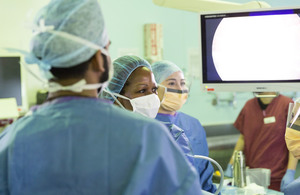One million courses have been started by children across the country through the National Tutoring Programme, the Education Secretary, Nadhim Zahawi, announced today (Friday 11 March).
Speaking at the Association of School and College Leaders conference in Birmingham, the Education Secretary announced the milestone alongside measures to further boost the number of children who can benefit from tutoring this year.
Of the estimated 1 million courses started since the beginning of the programme, around 532,000 were provided through the School-Led Tutoring route, which provides funding directly to schools giving them greater flexibility to source their own tutors, whether external or staff already working in the school.
As a result, up to £65m will be transferred into this route from the Academic Mentor and Tuition Partner pillars of the programme, giving more schools the autonomy and support to deliver high quality tutoring to as many children and young people as possible, and reflecting the department’s continued focus on following the evidence of what works.
The programme remains on track to deliver the ambitious target of two million courses overall this academic year.
To further support schools and meet increasing demand, the eligibility for recruiting Academic Mentors and schools has been updated, with minimum A level requirements replacing the requirement for a degree, along with increasing the rate of pay for all graduate mentors looking to enrol and support the programme.
Separately, while the Government expects group sizes of 1:3 to remain standard, schools working with tuition partners can now use their discretion when determining group sizes, with a cap of up to 1:6 to allow greater flexibility where needed (such as for phonics, where pair work is required).
Speaking at ASCL, Nadhim Zahawi, Education Secretary, said:
It’s important to step back and look at what we’ve achieved with the National Tutoring Programme.
Tutoring used to be something that was the preserve of only a fortunate few.
Thanks to this Government, today it’s benefitting all children who want it and need it, from Bristol to Blackpool and Newquay to Newcastle, helping them realise their potential.
I am proud to announce that more than one million tutoring courses have been delivered since we rolled out this programme last year.
I hope you will agree with me that what we are doing together on tutoring is an invaluable addition to our education system, and I am continuing to look at how we can make sure it is having as big an impact as possible.
In addition to the estimated 532,000 courses that have started through the school led route this year, 114,000 starts have been made on courses through Tuition Partners and an estimated 74,000 pupils have started packages through the Academic Mentor pillar of the programme.
The government is working closely with Randstad and the sector to make sure these numbers continue to rise, and tutoring continues to reach the students who need it most.
311,000 courses were delivered in the 2020/2021 academic year.
The Government intends to continue building on the success of the National Tutoring Programme this year, in particular the School-Led route.
Schools, tutors and other stakeholders have continued to provide feedback to the department over the course of the year – in particular regarding the need for a programme that is as simple as possible – and the department is exploring all options to make sure that feedback is reflected in the programme next year.
